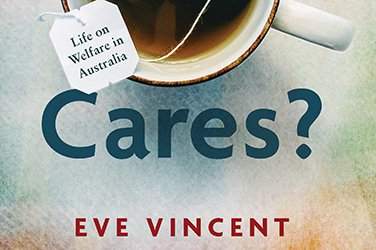
- Free Article: No
- Contents Category: Society
- Review Article: Yes
- Article Title: Care as concept
- Article Subtitle: A binding force revealed
- Online Only: No
- Custom Highlight Text:
According to its author, Who Cares? offers ‘an up-close, humane and grounded ethnographic account of life on welfare’. Eve Vincent foregrounds the perspectives of people who are subjected to ‘an endlessly reforming welfare system’. Vincent spent substantial time in the field, building relationships with her subjects, and while the history of welfare in Australia is neatly sketched and the social and political theories underpinning the study are worthy of interest, the voices of her subjects – those who live in poverty while being subjected to strict (and sometimes nonsensical) conditions – are the book’s most vital and captivating features.
- Featured Image (400px * 250px):

- Alt Tag (Featured Image): Shannon Burns reviews 'Who Cares? Life on welfare in Australia' by Eve Vincent
- Book 1 Title: Who Cares?
- Book 1 Subtitle: Life on welfare in Australia
- Book 1 Biblio: Melbourne University Press, $33 pb, 170 pp
- Book 1 Cover Small (400 x 600):

- Book 1 Cover (800 x 1200):

ParentsNext is a compulsory program for parents of young children who receive income support, obliging them to participate in various parenting and work-ready activities that are designed to push them towards employment. According to Vincent, ‘the Australian welfare system positions working women as ideal mothers’, and ParentsNext is underpinned by the belief that ‘impoverished women who stay home to raise their children’ need to be moulded into workers. She argues that ‘Caring is delegitimised as activity, while the parents of infants are recast as essentially unemployed.’
ParentsNext has also been plagued by mismanagement. Vincent provides confounding statistics, like: ‘85 per cent of parents on ParentsNext who had their income support temporarily cut off in the 2018–19 financial year were found not to have been at fault’. Alongside the threat of wrongful loss of income support, the program is partly implemented by low-wage, under-qualified employees of multinational conglomerates, who are prone to confusion and basic errors.
Imagine being a single parent who relies on everything going right in order to manage meagre funds and care for a small child, only to be informed that your payment has been suspended just as the bills are due. Will you have to beg someone for money? Will you be able to feed your child? Will you have somewhere safe to sleep if the decision isn’t reversed in time? Will the people who help you during this crisis do it willingly or grudgingly? How can your children thrive while you are under this kind of strain? The difficulties that carers have endured under ParentsNext suggests that the government is more concerned with extracting additional labour from impoverished mothers than with the welfare of their children.
The good news is that ParentsNext may soon be scrapped as well, a parliamentary committee having found that it does too much harm and recommending substantial changes. Vincent has captured two slices of Australian welfare history just as they begin to fade into history, but there is no evidence that the underlying principles that produced both programs have been abandoned.
According to Vincent, many people on welfare experience life as a series of encounters with uncontrolled and uncontrollable events, and ‘the card and ParentsNext often represented one more such interruption’, compounding those difficulties instead of alleviating them. Vincent sees a hidden purpose behind welfare’s anxiety-inducing conditions: recipients are being prepared for ‘low-wage, unpredictable and casualised work’. Insecurity and poverty are features of contemporary employment as well as unemployment.
Care and caregiving are central concepts for this book. Vincent wants to give them primacy in our political and personal dealings, to assert the value of caring both as work and as a binding social force, a testament to our interdependence. Caregivers are workers, she argues, and caring for the most vulnerable is a core function of decent societies and their governments. In contrast with this ideal, Who Cares? documents a period where the Australian welfare state extended ‘its transition to a more disciplinarian guise, marking an ever-diminishing offer of care to those in need’. Vincent avoids nostalgia for twentieth-century welfare programs, however, noting that they excluded and punished segments of the population due to biases around race, gender, and sexuality. Instead, she pleads for a new system of welfare underpinned by an expansive conception of care.
Much of the material in Who Cares? is enraging. One sixty-year-old woman, who is caring for her mother and has a history of fulfilling her responsibilities, says of the cashless debit card: ‘They’re taking the responsibility away from me … It’s treating me like a little kid again.’ Others speak of the humiliation associated with possessing the cashless debit card instead of an ordinary bank card. The card was not only infantilising in its restrictions; it was also a brand that people were forced to wear, to display their economic and social status whenever they made a purchase.
Vincent’s larger argument is shakiest when she advocates for a new and de-stigmatised conception of dependency as an extension of the ‘primal scene’ of an infant suckling its mother’s breast. She seeks to emphasise the mutually nourishing aspects of dependency, but her ambition is in conflict with those who speak of the humiliations associated with being infantilised by a controlling and distrustful system. For such people, the invitation to imagine themselves as a baby suckling at a benevolent and attentive mother’s breast is probably only marginally less demeaning than being treated like a naughty child.
Single carers – usually women – are worse off now than they were forty years ago. Social housing is a precious rarity, and rent prices are obscene. Full-time parenting is challenging under normal circumstances, but to care for a child or an impaired dependant while grappling with suffocating poverty requires uncommon stamina and ingenuity. Suspending essential payments to any person living under those conditions should always be taboo; instead, it has become the norm. Vincent shows that towards the end of the twentieth century Australia stopped caring for welfare recipients and began punishing them instead.


Comments powered by CComment